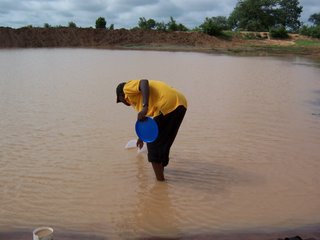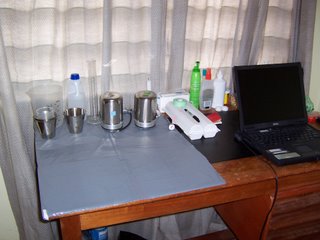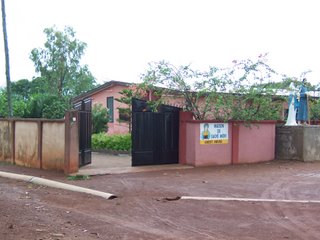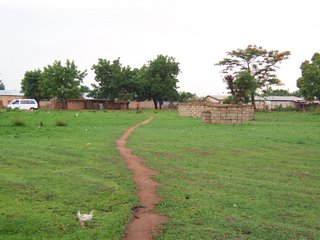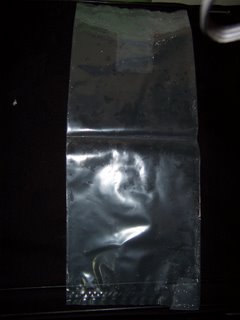I had forgotten what happens in developing countries when it rains. A huge storm with heavy winds swept in this morning around 6am and I remembered those days I used to spend reading in the hammock, mopping the floor of my poor campo house. My accommodations have certainly improved since then, considering that I no longer have a leaky roof. So I decided to stay home Wednesday and do some reading here at the guesthouse and then wait to see if my 4:00pm meeting would happen or not. I am assuming that if the day passes with rain then there will be no meeting.
Visitors arrived at the guesthouse last night and it’s a shame I was so tired and didn’t get to spend more time with them. They are a small, local NGO called Ibis (not reproductive health) that does community development with most of their funds coming from the Ghanaian government. It is always interesting to speak with educated people who have strong opinions about the US and opportunities to travel to the states.
I had an interesting conversation last night with a man from Ibis who spoke of an educated friend who was now in the states and working as a janitor at a hospital. I believe that people can make a difference by earning money in the states and sending it home, but I am more and more a believer of transferring knowledge and funds so that these countries are able to lift themselves out of poverty. Unfortunately, that is much easier said than done. At least I know that through improvements in health there can be some alleviation in poverty and an improvement in their quality of life. I suppose that’s what motivates me to work in this field.
After a few days of heavy reading this week I finally have a more substantial idea of how I’m going to spend these next 6 weeks before the rest of the team arrives in August and we shift modes to analyzing the “make” option for the ceramic filters here in Tamale.
Just a little background for those who don’t know- Pure Home Water is an organization that has a two year grant from the Hilton Foundation to investigate and attempt to implement a sustainable business that markets household water treatment technologies in the northern an most needy region of Ghana. Susan Murcott, Professor of Civil and Environmental Engineering at MIT is the facilitator of the grant and the woman with whom I am working. Pure Home Water is comprised of two social entrepreneurs, both young Ghanaian professionals, that are marketing and selling the filters in Tamale and two neighboring regions. The main product that is currently being sold is a ceramic filter that looks like a large flower pot sits suspended inside a plastic bucket, leaving room for water to be stored below the filter and has a spigot at the bottom of the container. This provides both water treatment and safe storage for a household.
In January, a team of engineering and business students from MIT came to Ghana for three weeks to do some background research as well as analyze the “buy” option. Pure Home Water has been buying the ceramic filters from a Ghanaian supplier in Accra and then selling them in the north. Unfortunately, with transport costs, manufacturing costs, and breakage in transport the ceramic filter costs too much for the average family- 180,000 cedis or about $19. The “buy” option will not be sustainable without significant grant assistance for years to come.
As a result, two other team members will be arriving in August and a third in September to fully analyze the “make” option. Can the business be sustainable if there was a facility in Tamale that could produce the filter locally? I will be working with an MIT business student, Howard, and a recent graduate from Harvard, Liz, to see if this will option will prove feasible. Both Liz and the team member arriving in September, Ali, will be staying for six months to help create a sustainable product- whether that is a filter or brand name has yet to be determined.
Until August arrives, I plan on doing my own research that will serve as a basis for my thesis work. The ceramic filter does not provide a viable solution for the poor; therefore, I will be testing a solar water bag to see if it can be a low-cost technology that would potentially be produced locally. The water is disinfected through both UV-A light and thermal radiation, and if you’re really motivated you can check out
http://www.sodis.ch/ for more information.
I am finally starting to formulate a plan and it feels good to have some direction. I will spend the first four weeks, starting next week, taking samples from local water sources, returning to the guesthouse to fill the solar water bags with the contaminated water, and then running water quality tests on the both the contaminated water and the disinfected water. This will provide a basis for the feasibility of the solar water bag to function in Ghana.
Then I will spend the last two weeks of July doing a small survey and some focus groups looking at the social and cultural acceptability of the solar water bag and specific design features. This will enable the MIT team that created the solar water bag to continue to improve the design and make a functional product for household water treatment in developing countries.
For those of you from Milwaukee- you’ll be interested to know that to improve water treatment after the Cryptosporidium outbreak of the 1990’s the local water treatment facilities upgraded their plants to include UV disinfection because Cryptosporidium cannot be killed through chlorination or other common water treatment techniques. Ok, so maybe that’s not that interesting to you- but I heard about it so many times during undergrad that I can’t quite forget it. Milwaukee was always the example of choice.
So, at the very least I have a plan. Sorry for such a long entry- I wrote this on my rainy day!

